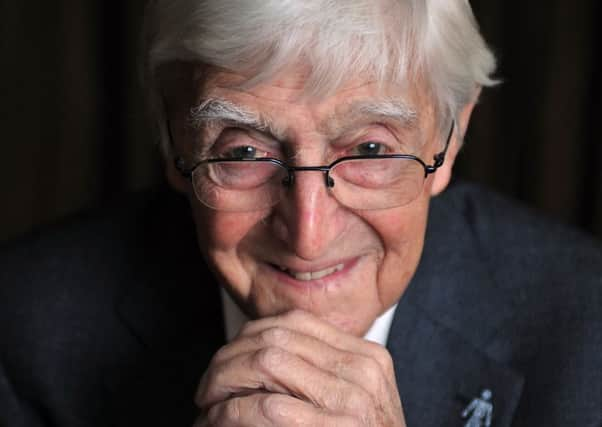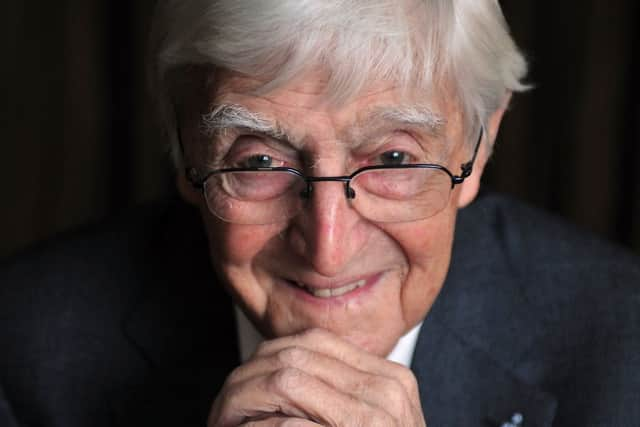Video: My style of interviewing is gone for good says Parky


In an interview with The Yorkshire Post, the veteran broadcaster said none of the current generation of chat show hosts like Graham Norton, Jonathan Ross and Piers Morgan replicate the work of Russell Harty, Sir David Frost - or himself.
“It’s gone. It’s like jazz music, you can’t hear it anymore,” he said. “I’m sure there are some young eager beavers out there, men and women, who would do a very classic talk show, an interview programme, but nobody seems very interested.
“Not that I’m volunteering - I’ve done my stint.”


Advertisement
Hide AdAdvertisement
Hide AdHe praised the “wonderful” Norton as the best of the bunch, but said his show is based on entertainment value rather than good interviewing.
The same is true of Ross, whose show is “an event thing with everybody having a good time and being daft”, while Morgan is “a mover for sure” and “has always been a good interviewer” but is let down by the intrusive format of his show, Sir Michael said.
The 79-year-old was in Leeds yesterday to receive the lifetime achievement award at the Variety children’s charity fundraising lunch, an honour he described as “equivalent to a Yorkshire cap” in cricket.
Sir Michael also bemoaned the bureaucracy that has entered the BBC, but fiercely defended the corporation against those enemies that would like to see its end.
Advertisement
Hide AdAdvertisement
Hide AdHe said: “I was very lucky that when I was there it was run by programme makers... They were either very good journalists or very good at showbusiness. They weren’t bureaucrats.
“Now it seems to me there are more bureaucrats than anything else. It shows in the broadcasting.”
When he was at the BBC, he could visit Bill Cotton, the populist light entertainment chief, and they would discuss an idea over a drink; if it was a good idea, he would go out and make it, said Sir Michael.
“Nowadays it would take about three years to circumnavigate the varous committees it would have to pass through before it passed under his nose,” he said.
Advertisement
Hide AdAdvertisement
Hide Ad“But I’m a BBC man through and through and think it’s the greatest broadcasting system throughout the world.”
Sir Michael would not be drawn on the question of who he thought was the greatest living Yorkshireman, a topic of hot debate after Prime Minister David Cameron said former Foreign Secretary William Hague held the title, provoking protest from Yorkshire cricket legend Geoffrey Boycott who said “what about Parky, Paul Sykes, Alan Bennett and me!?”
Sir Michael said: “I don’t like competitions about who’s the greatest this or that.
“You’ve got to serve your time. It doesn’t happen to you in your prime as a player or thirties. “It comes later. The test of fame... is a bit like Fred Trueman, you become a legendary figure.
Advertisement
Hide AdAdvertisement
Hide Ad“Fred for all his faults was not just the greatest bowler but was a wonderful character as well. But he wasn’t that when he was playing and bowling bouncers at people’s heads and that sort of thing and being disgraceful.”
His most difficult interview brings him to tears
People always ask Sir Michael Parkinson to name his favourite interview. So he gives a different answer every time.
“Orson Welles. Their face drops. Or Paul McCartney. If I don’t say Emu, they are really disappointed,” the veteran broadcaster told The Yorkshire Post.
“The question I really liked to be asked is, ‘which of your interviews did you find most difficult?”
Advertisement
Hide AdAdvertisement
Hide AdIt wasn’t with Muhammed Ali, the former heavyweight world boxing champion, said Sir Michael. It was with a terminally ill young mother in a South African township a decade ago.
The woman, who was aged in her early twenties, was dying of Aids and did not have long to live.
Her two young children were playing outside, while she was lying in bed in a foetal position. She was confused and distressed.
Sir Michael felt uncomfortable with the interview. The head of the project told him he was asking the wrong question; he should ask her why she sells her medicine.
Advertisement
Hide AdAdvertisement
Hide Ad“She whispered, ‘I do it to feed my children’,” he said, bursting into tears. “I cry when I tell this story. That was an indication of how dire the situation is and also how incompetent we are to deal with that sort of thing.”
Sir Michael was speaking ahead of his appearance at the Yorkshire Business Awards, the annual fundraising lunch for the Variety’s children charity.
He said the upside of being famous is you can use lend your fame to make money for charity. In the event, the audience of 400 business leaders at The Queens hotel raised £141,100 for needy and disadvantaged children in Yorkshire.
Sir Michael said: “The view I have always taken about something as absurd as fame is there has to be a good part to it. Otherwise it doesn’t make sense.”
Advertisement
Hide AdAdvertisement
Hide AdHe added: “I don’t want to sound too sad about being famous. There are great pluses as well. But the downside is you do lose part of yourself.”
Event host Christine Talbot, the ITV presenter, said Sir Michael’s television interviews “set the bar for all that followed”.